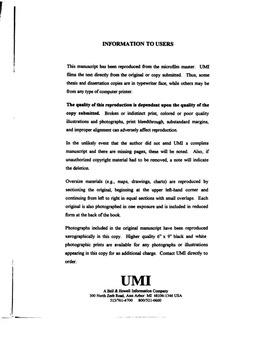| dc.contributor.advisor | Gardner, James E., | en_US |
| dc.contributor.author | Harlin-fischer, Gayle C. | en_US |
| dc.date.accessioned | 2013-08-16T12:29:57Z | |
| dc.date.available | 2013-08-16T12:29:57Z | |
| dc.date.issued | 1998 | en_US |
| dc.identifier.uri | https://hdl.handle.net/11244/5593 | |
| dc.description.abstract | Data for this study were collected from two questionnaires mailed to a stratified random sampling of elementary principals, general education teachers and special education teachers throughout Oklahoma. Several procedures were utilized to determine the reliability and validity of the instruments. The compiled data were then statistically analyzed quantitatively and reported through the use of descriptive and exploratory statistics. Qualitative questions were analyzed uniformly using appropriate qualitative methodology. | en_US |
| dc.description.abstract | The formal preparation of principals usually emphasizes knowledge and skills related to problem solving, judgment, organizational ability, leadership, sensitivity, stress tolerance, and communication (National Policy Board for Educational Administration, 1993). Unfortunately, issues related to special education are not specified within these standards and, therefore, not generally encountered in course work and experiences provided in general administrator preparation programs. The purpose of this study was threefold. One was to determine the skills and knowledge elementary principals, general education teachers, and special education teachers perceive necessary for principals to implement effective special education programs within general education settings. The second purpose was to investigate what differences, if any, exist between principals' general education teachers' and special education teachers' perceptions of the skills and knowledge necessary for principals to implement these programs. In addition, this study explored the perceptions of attitudes and behaviors which support inclusive programs for students with disabilities as viewed by principals, general education teachers, and special education teachers. | en_US |
| dc.description.abstract | Twenty knowledge and skills items were identified as clearly necessary for principals to implement inclusive special education programs in their schools by all three educator groups. Although principals and teachers generally agreed on knowledge and skills necessary for principals, disagreement came from special education teachers on items relating to assessment; screening, referral, and classification; and best practice in teaching and learning. Responses from this study also indicated conflicting perceptions regarding evidence that targeted schools provided educational services to students with disabilities in an age-appropriate manner or that instruction utilized methods and techniques consistent with inclusive special education practices. | en_US |
| dc.format.extent | xiii, 181 leaves ; | en_US |
| dc.subject | Education, Special. | en_US |
| dc.subject | Elementary school principals United States. | en_US |
| dc.subject | Education, Administration. | en_US |
| dc.subject | Children with disabilities Education United States. | en_US |
| dc.subject | Special education United States. | en_US |
| dc.title | Perceptions of the knowledge and skills necessary for elementary principals to implement inclusive special education programs / | en_US |
| dc.type | Thesis | en_US |
| dc.thesis.degree | Ph.D. | en_US |
| dc.thesis.degreeDiscipline | Department of Educational Psychology | en_US |
| dc.note | Source: Dissertation Abstracts International, Volume: 58-12, Section: A, page: 4508. | en_US |
| dc.note | Major Professor: James E. Gardner. | en_US |
| ou.identifier | (UMI)AAI9817725 | en_US |
| ou.group | Jeannine Rainbolt College of Education::Department of Educational Psychology | |
